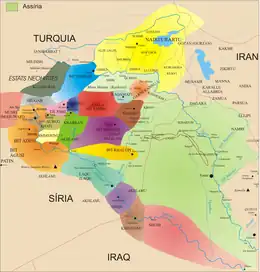
Aram-Naharaim (Hebrew: אֲרַם נַהֲרַיִם ʾĂram Nahărayīm; Classical Syriac: ܐܪܡ ܢܗܪ̈ܝܢ, romanized: ʾārām Nahrīn; "Aram between (the) rivers")[1][lower-alpha 1] is the biblical term for the ancient land of the Arameans referring to the region along the great bend of the Euphrates river.[2] Aram-Naharaim is also mentioned as Nahrima of the Arameans in the El-Amarna letters.[3]
It is mentioned five times in the Hebrew Bible[4] or Old Testament. In Genesis, it is used somewhat interchangeably with the names Paddan Aram and Haran to denote the place where Abraham stayed briefly with his father Terah's family after leaving Ur of the Chaldees, while en route to Canaan (Gen. 11:31), and the place from which later patriarchs obtained wives, rather than marry daughters of Canaan.
Both the Septuagint (early Greek translation of the Hebrew Bible) and Flavius Josephus translate the name as Mesopotamia.[5] Ancient writers later used the name "Mesopotamia" for all of the land between the Tigris and Euphrates. However, the usage of the Hebrew name "Aram-Naharaim" does not match this later usage of "Mesopotamia", the Hebrew term referring to a northern region within Mesopotamia.
The translation of the name as "Mesopotamia" was not consistent – the Septuagint also uses a more precise translation "Mesopotamia of Syria" as well as "Rivers of Syria".
During the Late Antiquity and throughout the Early Medieval period, regional dialect of Aramaic language was called Nahraya, an endonymic (native) term, derived from choronym (regional name) Bet-Nahrain, a variant Aramaic name for Mesopotamians regions in general.[6][7]
See also
Notes
References
- ↑ Sokoloff, Michael (2009). A Syriac Lexicon: A Translation from the Latin, Correction, Expansion, and Update of C. Brockelmann's Lexicon Syriacum. Eisenbrauns; Gorgias Press. p. 142a. ISBN 978-1-57506-180-1.
- ↑ Younger 2016, p. 96.
- ↑ "Aram Naharaim", Jewish encyclopedia.
- ↑ Genesis 24:10; Deuteronomy 23:4; Judges 3:8,10; 1 Chronicles 19:6; Psalm 60:1.
- ↑ Wevers 2001, pp. 237–51.
- ↑ Wright 1871.
- ↑ Butts 2019, p. 222.
Sources
- Butts, Aaron M. (2019). "The Classical Syriac Language". The Syriac World. London: Routledge. pp. 222–242.
- Lipiński, Edward (2000). The Aramaeans: Their Ancient History, Culture, Religion. Leuven: Peeters Publishers. ISBN 9789042908598.
- Younger, Kenneth Lawson (2016). A Political History of the Arameans: From Their Origins to the End of Their Polities. Atlanta: SBL Press. ISBN 9781628370843.
- Wevers, John W. (2001). "Aram and Aramaean in the Septuagint". The World of the Aramaeans. Vol. 1. Sheffield: Sheffield Academic Press. pp. 237–251. ISBN 9781841271583.
- Wright, William (1871). Fragments of the Turrāṣ mamllā nahrāyā or Syriac Grammar of Jacob of Edessa. London: Gilbert and Rivington.